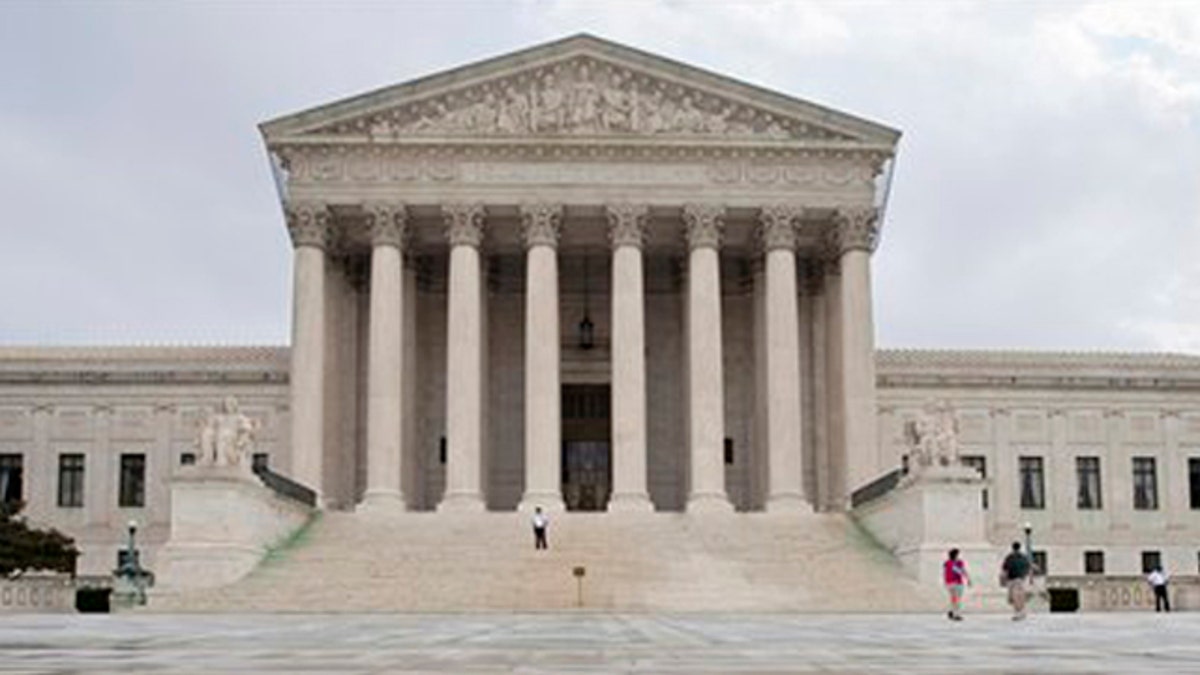
In this Sept. 28 photo, the front of the U.S. Supreme Court is seen in Washington. (AP)
The Supreme Court convened Monday for a term poised to cover weighty topics ranging from personal privacy to the status of Jerusalem to the legitimacy of the president's signature health care law.
A review of the federal health care overhaul is not on the docket yet. But the Obama administration last week urged the justices to take up the case, which has been meandering through a web of lower federal courts since its passage in early 2010. Should the high court accept the request, the justices will be deciding a case that would undoubtedly serve as a lightning rod in the middle of the 2012 presidential race.
To date, lower courts have been split over a key question -- can the federal government force individuals to buy health insurance? The so-called individual mandate is considered a linchpin to the entire policy, as it ensures millions more Americans get coverage without passing health care costs onto the rest of the system. And it provides the insurance companies with a boom in enrollment to help offset losses from new restrictions. However, more than two-dozen states say it's unconstitutional.
Absent a health care law review, the Supreme Court is still tackling some hot-button issues.
Among them is a dispute over whether the government has the power to track a suspect's movement using a GPS without a warrant.
The court is also considering whether immigration officials should factor in whether illegal immigrants came to the United States as children in deciding whether to deport them.
At least one case has the potential to echo into the world of Middle East policy and politics. At a time when the Palestinians are petitioning the United Nations for statehood recognition, the Supreme Court is being asked to decide on a case that hinges on the status of Jerusalem.
In the case, Jerusalem-born Menachem Zivotofsky's parents want his U.S. passport to list his birthplace as Israel, though U.S. policy does not recognize the once-divided city as belonging to Israel.
Congress passed a law in 2002 giving Jerusalem-born U.S. citizens that option, but presidents of both parties have directed the State Department to ignore the law, saying it wrongly interferes with the president's powers.
Had the child been born elsewhere in Israel, the State Department would have issued a passport listing his place of birth as Israel. But the department's guide tells consular officials, "For a person born in Jerusalem, write Jerusalem as the place of birth in the passport."
Among the cases involving criminal defendants is one from an inmate awaiting execution in Alabama who missed a deadline to appeal his death sentence because the big-firm lawyers in New York who had been handling his case for free moved on to new jobs, and letters from the court clerk sat in the firm's mailroom before being returned to sender.
The case of Cory Maples, convicted 15 years ago in the shooting deaths of two men, presents the question: "How much poor representation can one criminal defendant receive" before it violates the Constitution? said University of Maryland law professor Sherrilyn Ifill.
The nation's major broadcasters are focused on one case that has the potential to reshape regulation of the airwaves. The federal appeals court in New York threw out the Federal Communications Commission's rules that apply when children are likely to be watching. That includes a ban on the use of curse words as well as fines against broadcasters who showed a woman's nude buttocks on a 2003 episode of ABC television's "NYPD Blue."
The television networks argue that the policy is inconsistently applied and outdated, taking in only broadcast television and leaving unregulated the same content if transmitted on cable TV or over the Internet.
The court is beginning its second year with the same complement of justices after consecutive terms of welcoming new members, Sonia Sotomayor and then Elena Kagan.
Those two justices, on the liberal-leaning side of the court, voted together on almost every case last year. The same was true for Chief Justice John Roberts and Justice Samuel Alito on the other side of the ideological spectrum.
With the health care suit potentially on the high-court horizon, several groups already have gotten started making the argument that certain justices should recuse themselves because of their personal entanglement with the issue.
Some groups want Kagan off the case because of her role in the Obama administration as solicitor general, formulating the legal defense for the health care law.
Kagan says she was not involved in developing the legal strategy of the Affordable Care Act, but opponents of the law have requested records of the administration's deliberation process to see who participated.
Conversely, liberal groups and some Democrats in Congress say Justice Clarence Thomas shouldn't be on the case because his wife worked for organizations that actively opposed the health care law. On Thursday, 20 House Democrats requested a federal investigation into whether Thomas broke federal disclosure laws by not listing his wife's pay on a disclosure form for 21 years -- even though her job at the time was no secret.
The Associated Press contributed to this report.




